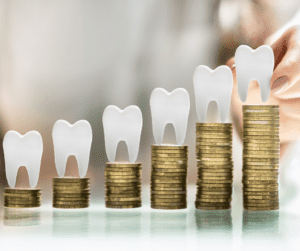We get asked all the time if extras private health insurance is worth it. With the cost of living and mortgage repayments increasing, many of our patients are re-considering their need for private health insurance. Earlier this year, many private health funds announced increases to their premiums, with a few deferring this until later in the year. Many health insurance policies are confusing, and they are all completely different, making it hard to compare like for like. Before deciding if it’s another expense that needs to be cut, read on to find out a bit more about how private health insurance works for dental treatment.
First and foremost, this is a dental blog, not a financial blog. None of this information is intended as financial advice. Secondly, private health insurance is divided into ‘Hospital Cover’ and ‘Extras Cover’. Hospital cover is for trips to hospital and is only relevant to dentistry if you are going to hospital for treatment, e.g., to have teeth removed under general anaesthetic. At Dentistry On George, if you are paying for treatment and using your health insurance, we will be claiming the ‘extras’ and so we will only be discussing ‘extras’ health insurance here.
However, it is worth noting that your hospital cover and your extras cover do not have to be with the same company. We have many patients who have hospital cover that they are happy with, but they haven’t shopped around for their extras. You can have hospital cover, and no extras cover. Or you can keep your hospital cover with your current insurer, and shop around for a better deal on your extras.

How does health insurance for dental treatment work?
Generally, ‘Extras’ cover is for private health care not conducted in a hospital. Each health fund will have their own options for what is on offer, but this can cover things such as dental, optometry, physiotherapy and other allied health that is carried out in private practice.
Different policies do this differently. Each fund will have an annual limit. Some funds may allocate a limit for each type of provider, e.g. $500 for dental, $500 for physio. Others may not split it and give you say $800 a year to spend on any of the services covered by your policy.
Some health insurers split dental into ‘major’ and ‘general’ and will give a different limit for each category. What they classify as major dental varies with each fund, but generally this can include things like implants, surgeries, root canal and crowns. However, each fund is different. Some funds might even split things further into general, major, orthodontic and endodontic (root canals). Read your product information statement thoroughly. If you have absolutely no intention on getting braces, there’s no point having cover for orthodontics.
Some health funds will exclude certain procedures e.g., implants or cosmetic dental work. Other funds give higher rebates or ‘no gap’ for preventive dental care, e.g., check-ups, cleans and fluoride, whereas other funds only allow two check-ups per year. Confusing, isn’t it?

What is a Preferred Provider or Member’s Choice practice?
Some health funds have ‘Member’s Choice’ or ‘preferred provider’ dentist. This is purely a financial agreement between the dental provider and the health fund. The contracted dentist has agreed to provide a dental service at a fee agreed with the health fund. The health fund will then advertise ‘no out of pocket expenses’, but only if you see one of their dentists. The dentist is providing the same service at a reduced fee, in return for receiving a higher volume of patients. The “preferred practitioners” are not actually preferred because of dental ability, nor are the practices held to a higher standard.
This is limiting the choice patients have over who their dentist is. Continuity of care is so important. Finding a dentist that you like and trust should be your priority. Sticking with them over the years means they get to know you, your history, your family. In addition they will become your trusted adviser and friend. We strongly believe that a great relationship with your dentist is the key to successful outcomes and ultimately great oral health Your health fund shouldn’t be penalising you for going to the dentist you like.
At Dentistry On George, we are proud of the fact that we are entirely independent. We are not linked to any one health fund and have chosen not to participate in these health insurance schemes. What this means is that we can set our own fees, which allows us to buy the best materials and equipment, employ the best staff, avoiding cutting corners and ultimately provide the best care for our patients.
However, we do offer HICAPs services, which means that we can claim your health insurance, no matter who you are with, at the time of your treatment and process your rebate on the spot.

Do I actually need ‘extras’ health insurance?
First thing to work out is what allied health services you actually use. Look back over past receipts or think about what you might be needing in the near future. Add up how much your total bills were over the pat year – the total amount, before any health rebates. Compare this amount of what you would have spent if you had no insurance, with what you paid in premiums plus gap fees. This can help you decide if your ‘extras’ cover is worth it.

Who can I turn to for impartial advice?
Some comparison websites won’t compare all the funds. Funds pay to sign up with these companies. If you just use comparison websites, you’ll be missing out on all the options.
The government have a website that will give you comprehensive, independent private health insurance information. Another great source to try is the Fair Health Care Alliance, who have been backed by the Australian Dental Association. They will find out your insurance needs and do all the calculations and comparisons for your you.
If you want to read more from the Australian Dental Association, check out their page on private health insurance here



